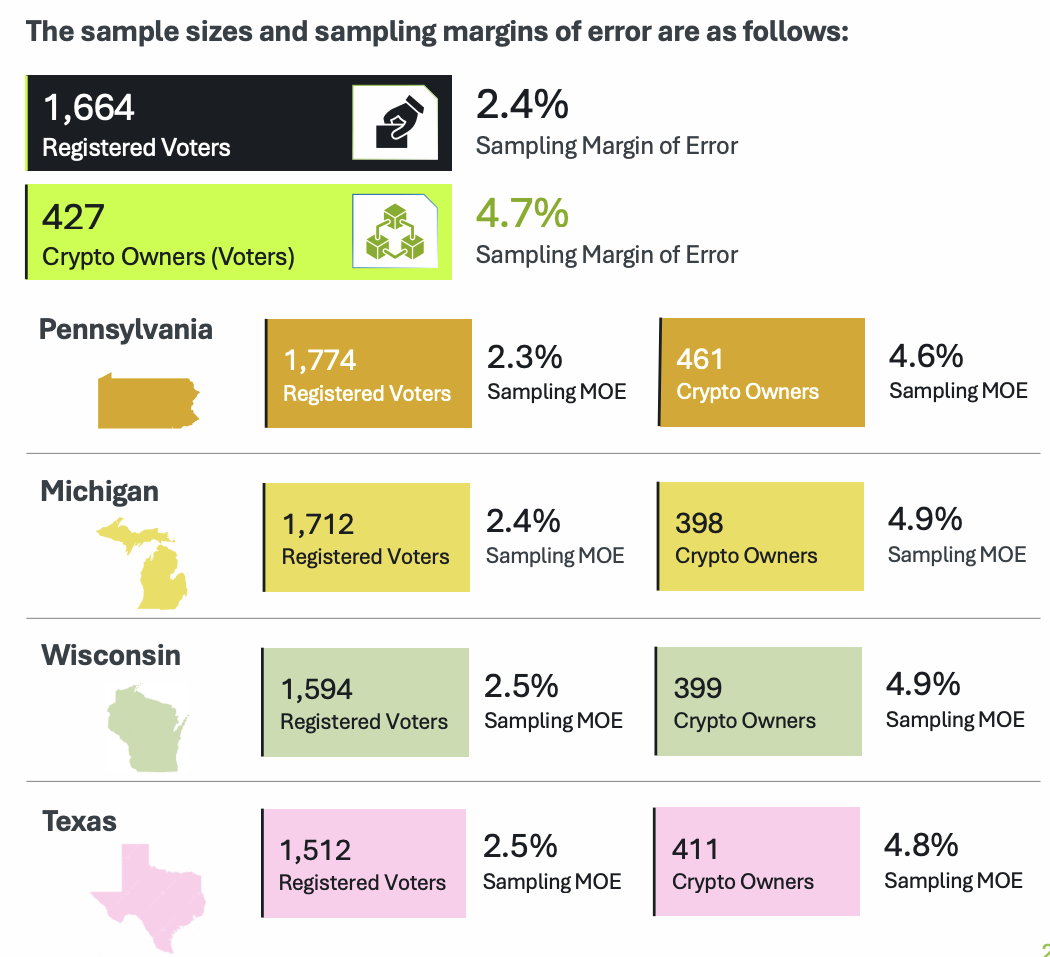Consensys and HarrisX released a survey on the US election. Voters have a clear preference for friendly crypto policies, but neither party nor candidate has a convincing lead as the pro-crypto option.
Republicans have a slight lead in perceived crypto-friendliness, but Democrats gain more from cross-party voters.
Areas of Interest
Consensys, in partnership with market research and data analytics firm HarrisX, released a new study on the upcoming US election. In its introductory blog post, the firm addressed several key areas of interest: crypto voters’ preference of party and candidate, the importance of crypto as a voting issue, in-depth looks at swing states, and more.
The swing state polling was a core component of the survey’s methodology. Of the four specifically targeted states, two polled more registered voters than the nationwide survey.
Additionally, in all geographic categories, non-crypto-owning voters dwarfed the crypto owners. These choices help reflect a more accurate state of voters and focus on key battlegrounds.
Read More: Top Crypto Events in 2024

Crypto Voters’ Preference
The survey identified several interesting trends on a national scale. Half of nationwide voters consider crypto an important issue, but this number jumps to 85% among crypto owners. Additionally, 92% of crypto owners responded that they were likely to vote, making them a potentially important voting bloc.
One immediate standout from polling data is the lack of clarity in crypto regulation. Donald Trump’s public pro-crypto policies have 56% support and Kamala Harris’ 55%.
Voters perceive the two major parties as more or less equally trustworthy to set crypto policies. An important caveat, however, is the 54% of voters that claimed the importance of Harris clarifying her policy stances.
“It’s no surprise that this voter block, which is up for grabs by either presidential campaign, could tip the scales in an election that increasingly looks likely to be decided by a thin margin. In each state we polled there are today more crypto motivated voters than the last presidential election’s margin of victory,” said Dritan Nesho, Founder and CEO of HarrisX.
Looking at the state-focused poll results, another important trend is apparent. All four state polls showed a slight preference for the Republican party as the preferred group to set crypto policies.
However, in every state but Texas, Democratic candidates gain an advantage in cross-party crypto voters thanks to friendly policies. Pennsylvania, Michigan, and Wisconsin will be important swing states, so pro-crypto policies could have an outsized impact on these races.
“There’s a myth that the crypto sector doesn’t want regulation, but that’s simply not true. The results of this poll show that crypto is a bipartisan issue, with voters also calling for clarity and a pro-crypto stance,” claimed Joe Lubin, CEO and Founder of Consensys.
Read More: How Does Regulation Impact Crypto Marketing? A Complete Guide
In any event, state and nationwide voters agree that crypto has an important role in the country’s economic future, but that the government is not doing enough. For either candidate to squeeze through a narrow path to victory, clear and supportive policies toward crypto will be a powerful tool.
 beincrypto.com
beincrypto.com
